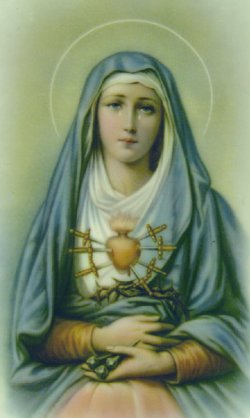Surely other world religions, and even some fellow members of Christianity, must look at the Catholic Church with a head scratching bewilderment as Sept. 15 arrives and the Church celebrates the liturgical memorial of Our Lady of Sorrows.
[. . .]
Most Christians, therefore, understand in essence the Sept. 14 feast of the "triumph" of the Cross of Jesus. For through his suffering, death, and resurrection, Satan is defeated, death loses its sting, and the gates of paradise are flung open to all who will receive the pass of the Passion. That is something to celebrate.
But why the Sorrowful Mother?
We could just as well ask St. Paul why he instructs all Christians to "make up what is lacking in the sufferings of Christ for the sake of his body, which is the Church" (Colossians 1:24).
We Christians, too, will suffer and do suffer. Our suffering has the capacity to release a portion of the infinite graces merited by Jesus at Calvary, what theologians call "objective redemption." But as these redemptive graces of Jesus must be personally received by the human heart, every Christian has a role in this mysterious release and reception of grace which theologians call "subjective redemption."
Mary alone, as the "New Eve" with Jesus the "New Adam", participates in both objective and subjective redemption: both in the historic acquisition of redemptive grace and in the providential release of redemptive grace. Blessed John Paul would teach of his mother and ours that Mary's intensity of suffering at Calvary was a "contribution to the redemption of all" ("Salvifici Doloris," 25).
This is why the Church, including popes, saints, mystics, and faithful alike, have traditionally referred to Mary as the Co-redemptrix. In the simplest of explanations, this title means that Mary helped Jesus save souls like no other.
[. . .]
We celebrate the Mother's suffering because it is right to acknowledge her unique role with Jesus in redeeming the world. We also celebrate the Mother's suffering because we crucially need the example of a human who does not have a divine nature, but who also offered every sorrow of mind, heart, and body for the salvation of others.
Read the full article here.

No comments:
Post a Comment